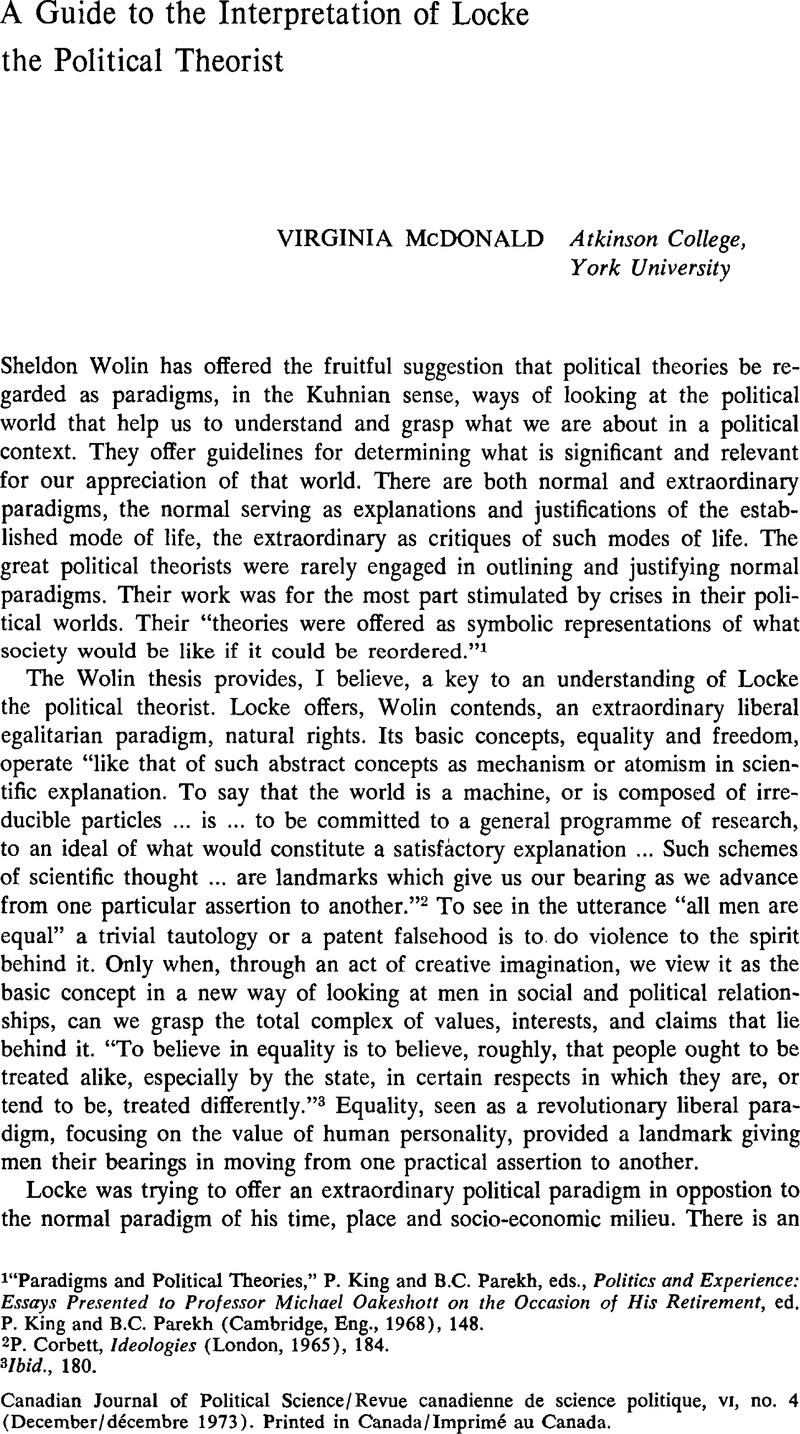Article contents
A Guide to the Interpretation of Locke the Political Theorist
Published online by Cambridge University Press: 10 November 2009
Abstract

- Type
- Articles
- Information
- Canadian Journal of Political Science/Revue canadienne de science politique , Volume 6 , Issue 4 , December 1973 , pp. 602 - 623
- Copyright
- Copyright © Canadian Political Science Association (l'Association canadienne de science politique) and/et la Société québécoise de science politique 1973
References
1 “Paradigms and Political Theories,” King, P. and Parekh, B.C., eds., Politics and Experience: Essays Presented to Professor Michael Oakeshott on the Occasion of His Retirement, ed. King, P. and Parekh, B.C. (Cambridge, Eng., 1968), 148.Google Scholar
2 Corbett, P., Ideologies (London, 1965), 184.Google Scholar
3 Ibid., 180.
4 As Laslett has pointed out, Locke's Two Treatises was prompted in the first instance by opposition to the Tory monarchical position which was firmly entrenched in 1679 and philosophically defended by reference to Filmer's Patriarcha. In the second instance it served as justification of a revolution (1688) against a similar appeal to the rule of despotic will against the rule of law. In the first instance, Locke and Shaftesbury's efforts to make the egalitarian paradigm prevail failed, leading to Shaftesbury's imprisonment and Locke's exile. By 1688 the normal authoritarian paradigm gave way to a growing opposition which found in Locke's Two Treatises the justification for their “Glorious Revolution.”
5 All references to Locke's Two Treatises are from John Locke: Two Treatises of Government: a Critical Edition with an Introduction and Apparatus Criticus, ed. Laslett, P., (Toronto, 1965).Google Scholar
6 Ashcraft, R., “Faith and Knowledge in Locke's Philosophy,” John Locke: Problems and Perspectives: a Collection of New Essays, ed. Yolton, J.W. (Cambridge, Eng., 1969), 219–21.Google Scholar
7 For an elaboration of this point see in particular my observations in this paper in the sections “Transition from Tracts to Treatises” and “Stage 5: The Right to Revolt.”
8 Locke, quoted in Dunn, J., The Political Thought of John Locke: an Historical Account of the Argument of the ‘Two Treatises of Government' (Cambridge, Eng., 1969), 253—4.CrossRefGoogle Scholar
9 Ibid., 231.
10 Locke, J., Two Treatises of Government, ed. Laslett, P. (Toronto, 1965), Introduction, 82–3.Google Scholar
11 Quoted in Dunn, Political Thought of John Locke, 7.
12 The Political Theory of Possessive Individualism: Hobbes to Locke (3rd ed.; Oxford, 1965), 194.
13 Ibid., 261–2
14 “Locke on the Law of Nature,” Philosophy, LXVII (October 1958), 495, 498.
15 Laslett's Introduction to Two Treatises of Government, 123.
16 Ibid., 109.
17 Locke, J., Two Tracts on Government, ed. Abrams, P. (Cambridge, Eng., 1967) Introduction, 96–7.Google Scholar
18 Locke, J., Of the Conduct of the Understanding, Works (Aalen, Ger., 1963), III, 208, 211.Google Scholar
19 Locke, quoted in Political Theory of Possessive Individualism, 225.
20 The Reasonableness of Christianity, As Delivered in the Scriptures, Works VII, 142.
21 Ibid., 140.
22 Ibid., 146–7.
23 Dunn, Political Thought of John Locke, 39.
24 Ibid., 249.
25 Seliger, M., The Liberal Politics of John Locke (London, 1968), 231.Google Scholar
26 Ibid., 231.
27 Ashcraft, R., “Locke's State of Nature: Historical Fact or Moral Fiction?,” American Political Science Review, LXII, no. 3 (September 1968), 911.Google Scholar
28 As Ashcraft notes: “It may be objected that what we have labelled the ‘second phase’ of the state of nature is not that ‘natural condition’ of man, but the ‘early stages’ of civil society. But Locke is quite explicit regarding the conditions under which political society comes into being” Ibid., 912. For an illuminating discussion of Locke's shift from historical description to moral prescription in his analysis both of the state of nature and of political society, see the above article, 898–915.
29 H. Aarsleff, “The State of Nature and the Nature of Man,” in Yolton, John Locke, 102.
30 A Discourse on the Origin of Inequality (London and New York, 1955), 204–5.
31 Liberal Politics of John Locke, 100.
32 Introduction, Two Treatises of Government, 121.
33 Dunn, Political Thought of John Locke, 121.
34 Ibid., 121–2.
35 Introduction, Two Treatises of Government, 126.
36 Dunn, J., “Consent in the Political Theory of John Locke”, The Historical Journal, X, no. 2 (1967), 161.Google Scholar
37 Seliger, Liberal Politics of John Locke, 308–9.
38 “The Family and Origins of the State,” in Yolton, John Locke, 95.
39 Dunn, Political Thought of John Locke, 130.
40 Liberal Politics of John Locke, 282.
41 Political Theory of Possessive Individualism, 216–7.
42 Liberal Politics of John Locke, 288.
43 Political Theory of Possessive Individualism, 224.
- 1
- Cited by


